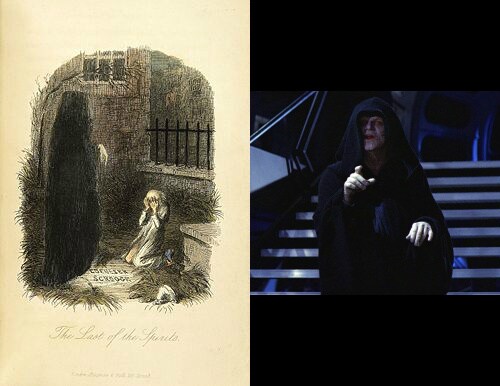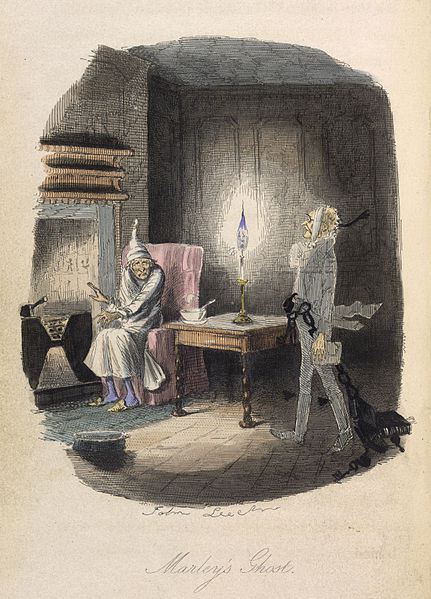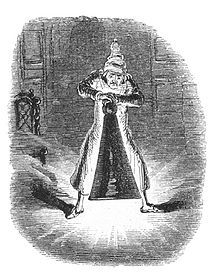Charles Dickens' classic A Christmas Carol and the story of a fallen Jedi have striking thematic similarities.
There are many wonderful stories that encapsulate the Christmas spirit, and emphasize the potential for human goodness and decency. These stories are time-honored traditions in the month of December, and I’m sure many of you have favorites that are sacrosanct for you and your families. Perhaps there has not been a more retold Christmas story than the Charles Dickens classic, A Christmas Carol, featuring the curmudgeonly Ebenezer Scrooge. Upon recently teaching this class to my freshmen students, I was struck by the similarities between Scrooge and the correspondingly conflicted Darth Vader. Perhaps they are not as dissimilar as one might originally think.
Written in 1843, Dickens’ novella showcased the hardships endured by the destitute of England, and is best known for the aforementioned Scrooge and his journey of self discovery through his experiences with his past, present, and future. Scrooge, as most are aware, is the aptly named cantankerous, apathetic miser, who is as stingy with his money as he is with the spirit of generosity. He is visited by three spirits, and through these famous encounters, learns to embrace his humanity, and to look beyond himself and his pain. His sense of goodness and compassion, long dormant, is joyfully resurrected, revealing his true self.
The same could be said of Vader’s journey of self discovery; the Dark Lord must also learn to accept his humanity, and to think beyond his pain and previous life choices, in order to let his inner self turn towards the light. Vader’s tragic past came to fruition in Revenge of the Sith in 2005, and while the full extent is being fleshed out for Star Wars-philes, the comparisons between these two famous characters reveals an intriguing juxtaposition of themes that equate to powerful storytelling.
The past: In A Christmas Carol, Scrooge is first visited by the Ghost of Christmas Past, which represents memory in the Dickens’ novella; the Ghost literally has a head of light, which turns into the faces of different characters that impacted Scrooge in his younger days. Scrooge is horrified, and literally tries to suppress the light, to no avail. Similarly, Vader is encased in his own living tomb of darkness (the absence of visible light), and suppresses the visions of his past at the expense of others, not unlike the uncharitable, suppressive nature of Scrooge’s actions.
More specifically, Scrooge suppresses the loss of his beloved, the aptly named Belle; Belle sadly states that she has been replaced by a new idol, “a golden one.” Scrooge’s heart is corrupted by greed, and a false sense of control, and he loses the love of his life. His choices define him, and sends him spiraling towards a singular goal: greed. Vader experiences similar loss, as he seeks to save his beloved, only to lose her in the name of saving her. Scrooge believes he can obtain money to find happiness, and Vader seeks to obtain power over death. Both seek power for selfish purpose; these expectations are unrealistic and vain. It is only when they seek to help others that they rediscover their respective place in each one’s particular universe.
The present: Both Scrooge and Vader exhibited complete and total disregard for their fellow man, and the result, on both accords, is the stuff of legend. When two gentlemen seek Scrooge out and inform him the poor and destitute are in need, Scrooge suggests “the idle” would be better off in a prison or workhouse. When told, “Many can’t go there; and many would rather die,” Scrooge shockingly states, “Then they had better do it, and decrease the surplus population.” As his name suggests, Scrooge is lacking in compassion, and has total disregard for those he deems rebellious to his status quo. Conversely, Vader has no tolerance for those who seek mercy, or are rebellious to the cause of the Empire. His lack of empathy helped to cement his place in the galaxy as a ruthless tyrant, incapable of compassion or joy.
Both men are capable of doing so much good, and for both of them, it takes a boy to guide them towards the Light.
The future: At first glance, Tiny Tim and Luke Skywalker appear to have nothing more in common than their status as male fictional characters, but upon further reflection, it is fair to say that their love, as well as their belief in goodness, lead both Scrooge and Vader towards an epiphany of their own that forever changes the course of history, and helps enact a more positive future. Tiny Tim will lose his life, due to his fading health and poor care, due, in no small part, to the lack of financial support his father, Bob Cratchit, is able to provide (thanks to the actions of Scrooge). Had Scrooge not reflected on the future, and changed the course of his actions, Tiny Tim would have died, and all hope would have been lost.

It is these glimpses of the future that help to influence the actions of both men. Ironically, both the Ghost of Christmas Yet To Come and the Emperor are cloaked in black, and are harbingers of impending doom for all, if things do not change. Luke Skywalker is also dangerously close to losing his life, thanks to neglect from his own father on the second Death Star, and, if not for the metanoia of Vader, may very well not have been the New Hope that changed the direction of the galaxy. Fortunately, Vader’s transformation comes about, signaling the end of oppression, and, as both veiled figures depart from each story, they help to restore peace and freedom to each fictional universe.
Both Ebenezer Scrooge and Darth Vader experiences personal growth and overcome intense heartbreak to be the heroes of their respective stories. These changes inspire and promote compassion in the heroes, as well as in the audiences that enjoy these beloved tales of coming out of darkness, and choosing the light. Perhaps there isn’t a better metaphor this holiday season. Happy Holidays to all!
Dan Zehr is a high school English teacher with an MS in Teaching and Learning, and is a member of the Rogues (as Blue Leader), a network of teachers that incorporate Star Wars in the Classroom. He also runs Coffee With Kenobi (with co-host Cory Clubb), a Star Wars podcast that analyzes the saga through critical thinking, analysis, interviews, and discussion.



